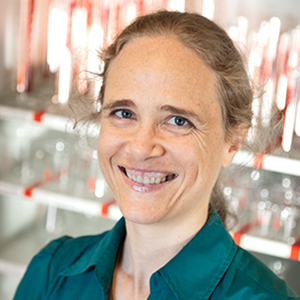Awards speech from Kristina Miller, HAU Chair

Nicola Clegg
In 2019, the Herschel Alumnae Union received 11 nominations for the Caroline Herschel Award. The selection committee reviewed each and every nomination thoroughly and although the decision was a difficult one, in the end, the overwhelming choice made was, Nicola Clegg.
When I read about Nicola’s achievements in her life and career I felt very inspired and proud, a little intimidated, but mostly inspired. I asked Nicola to provide with a summary of these which I will read here and then we will play a video she has recorded for us as she’s currently attending a conference and can’t be with us here today.
I’ll warn you now that there are a lot of medical terms in here which you may have to google later, but …. In the words of Nicola Clegg:
The contributions of which I am most proud – in scientific research, education and leadership – have been enabled by teamwork and are driven by my curiosity, sense of adventure, and passion for helping and empowering others.
After matriculating from Herschel, I attended the University of Houston on an academic and swimming scholarship, co-captaining the NCAA Division I Women’s Swimming and Diving Team. My scientific journey was sparked by undergraduate research experiences, and I pursued a PhD in Chemistry and Chemical Biology at the University of California San Francisco (UCSF), studying how breast cancer and osteoporosis therapies might be improved. At UCSF, I was mentoring chair for the Women in Life Sciences organization, creating opportunities to share career aspirations and obtain advice from established female scientists.
I began my postdoctoral traineeship in cancer biology at the University of California Los Angeles (UCLA), later relocating to Memorial Sloan-Kettering Cancer Center (MSKCC) in New York City. Eager to learn about the mechanisms of human disease, I studied the development of prostate cancer from a hormone-sensitive disease to the fatal, drug-resistant stage, and I developed novel anti-androgen drugs for the treatment of castration-resistant prostate cancer (CRPC). While there I realised the potential for my lab research to impact the lives of patients in the clinic.
I discovered genetic pathway alterations that accelerate the development of prostate cancer in mice, and render tumours less sensitive to targeted cancer therapy. I helped characterize the novel mechanism of action for a prostate cancer drug that was co-discovered by our lab (MDV3100, Xtandi, enzalutamide), and is now approved for the treatment of metastatic CRPC. I also led a multidisciplinary team of senior scientists in the preclinical development and initial regulatory application of a second-generation drug for CRPC (ARN509, Erleada, Apalutamide), now approved worldwide for the treatment of non-metastatic CRPC.
Following my postdoctoral fellowship, I became a project manager for the development of cancer drugs at the pharmaceutical companies Novartis and Genentech. My role is to collaborate with scientists and clinicians to define strategies for the discovery and development of cancer therapeutics. These include potential targeted therapies for breast cancer, lung cancer and melanoma, as well as immunotherapies that harness one’s own immune system to fight the cancer cells. I draw on my scientific experience and my communication and leadership skills to integrate complex ideas and processes, facilitate successful decision-making, and lead and motivate teams.
In order to excite a sense of discovery in future generations, I volunteer with the Genentech Future Lab program, providing scientific education outreach to underserved schools in the community: I am a mentor to elementary school students in the GeneAcademy program, and a teaching assistant for Science Garage, a lab-based biotechnology curriculum for high schools. I completed a program in Outdoor Education with the National Outdoor Leadership School, and I volunteer as a river-rafting guide for ETC7, an organization that takes at-risk youth and people with disabilities and life-threatening illnesses on whitewater river-rafting trips. I am inspired by their courage and sharing a sense of teamwork and accomplishment.
I am honoured to be nominated for the Caroline Herschel award, particularly as it is named for a woman whose pioneering scientific discoveries were achieved despite significant cultural and societal challenges. I am grateful for the support of many wonderful mentors throughout my training and career and am motivated in turn to help those in my community, whether as a leader, an educator or through my career as a researcher and developer of cancer drugs.
Thank you.
Nicola couldn’t be with us here today but her parents, Joanne and Warren Simpson, and David and Jane Clegg are. I would now like to call up Joanne Simpson and David Clegg to receive her award on her behalf.